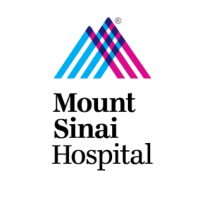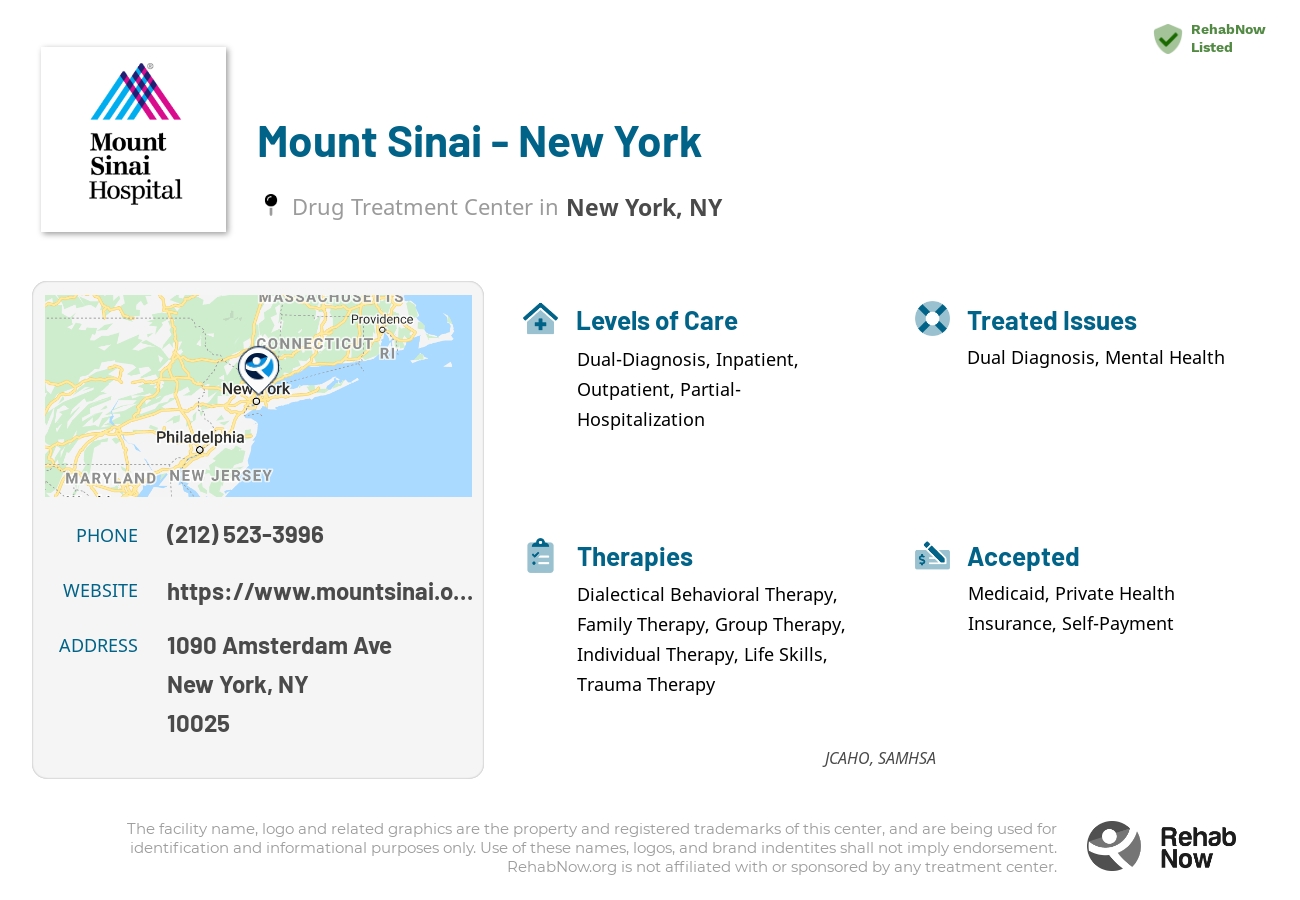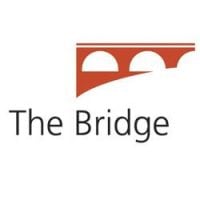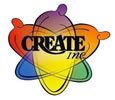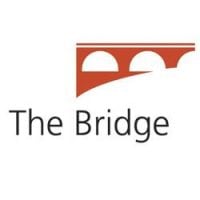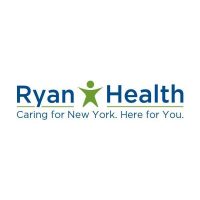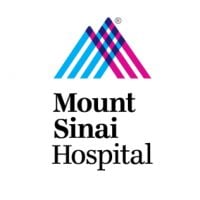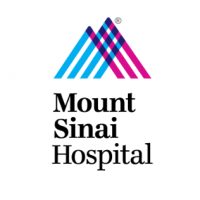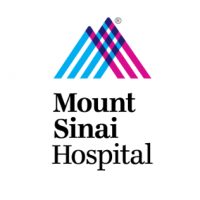Mount Sinai - New York
Drug Rehab Center in New York, New York
Mount Sinai - New York is a reputable mental health and addiction treatment facility that offers a range of therapy options and multiple levels of care to help individuals with mental health disorders, while also accepting private health insurance for their services.
About Mount Sinai - New York in New York
Mount Sinai - New York, located in New York, NY, is a highly esteemed treatment facility that specializes in providing comprehensive care for individuals suffering from Dual Diagnosis, Mental Health, Alcoholism, Opioid Addiction, Drug Addiction, and Substance Abuse. With JCAHO and SAMHSA certifications, Mount Sinai - New York is recognized for its commitment to maintaining high-quality standards of care. They offer a range of treatment options such as Dual-Diagnosis, Inpatient, Outpatient, Partial-Hospitalization, Detox, and Aftercare Support Levels of Care. As an accredited facility, Mount Sinai - New York accepts Private Health Insurance and is affiliated with the renowned Mount Sinai health system, assuring patients of their dedication to delivering exceptional care.
Mount Sinai - New York provides a myriad of services to address various addiction and substance abuse issues. Through their Dual-Diagnosis program, they cater to individuals who not only struggle with addiction but also have underlying mental health conditions. Their inpatient, outpatient, and partial-hospitalization programs provide intensive and customized treatment plans tailored to meet each patient's specific needs. Additionally, the facility offers detoxification services to help individuals safely and comfortably withdraw from substances. Mount Sinai - New York also goes beyond primary treatment by offering comprehensive aftercare support to help individuals maintain their recovery journey.
Genders
Ages
Modality
Additional
Accreditations
SAMHSA

JCAHO
Conditions and Issues Treated
Dual Diagnosis therapy is considered more successful than traditional rehab methods because it treats the addiction and the underlying mental health disorder simultaneously. This comprehensive approach gives New York, NY patients the best chance for long-term recovery. If the patient does not receive treatment for both conditions, they are more likely to relapse.
Levels of Care Offered
This center offers a variety of custom treatment tailored to individual recovery. Currently available are Dual-Diagnosis, Inpatient, Outpatient, Partial-Hospitalization, with additional therapies available as listed below.
Inpatient facilities offer a complete rehab program where the patient stays for an extended period. This allows the staff to monitor the patient on a round-the-clock basis and provide medical assistance if needed.
A significant benefit of inpatient rehab is that it allows for a safe environment for treatment. The patient doesn’t have access to drugs or alcohol, and they’re surrounded by people that want them to succeed and change their lives. Treatment starts with detox and behavioral therapy, followed by group therapy and family involvement.
Outpatient treatment consists of counseling and therapy sessions. The outpatient treatment process begins with the addict’s initial detox period, lasting about ten days. Outpatient treatment is used for those who are at moderate risk for “slipping back” into the addiction. It is also used for those who are not currently experiencing any side effects from withdrawal, can handle social pressure, have a stable living environment, and have a good support system.
PHP or Partial Hospitalization Program treatment is a treatment that takes place in a treatment facility for an individual affected by addiction. This treatment is generally more than outpatient treatment and less than inpatient treatment. It can be adjusted for an individual’s treatment needs.
Therapies & Programs
Individual Therapy is a crucial component of addiction recovery. Therapists work with patients to identify the root of their addiction and figure out how to better handle the issues that led to them using drugs. Individual Therapy is one on one sessions where people meet with their therapist. Individual therapy provides a safe space for people to open up and discuss personal and sensitive topics which they may not feel comfortable discussing in a group setting.
In this type of therapy, therapists can develop specific solutions for each patient, which helps speed up their recovery process. In addiction recovery, therapy is a crucial part. It allows patients to go deep into their core issues and discover how those problems can be better handled now. Therapy can be performed in individual sessions as well as group settings. In individual therapy for addiction, the patient meets with the therapist one-on-one to focus on the underlying issues of addiction and come up with solutions to prevent future abuse.
Family therapy is a crucial part of drug treatment and getting sober. It is one of the most effective ways to help addicts stay on the path to long-term sobriety. One of the most important parts of family therapy is the relapse prevention plan. During treatment, therapists and doctors will often sit down with the addict and their family to develop a plan if the addict ever feels like they want to use again. This plan should involve steps the addict and family can take together to prevent them from relapsing in the future.
An addict’s family can play a vital part in helping them to avoid relapse because they can spot the warning signs and help them get back on track before it becomes too much of a problem. Family therapy is one of the most effective ways to help addicts stay on the path to long-term sobriety.
Group Therapy is employed by drug treatment centers like Mount Sinai - New York to provide the recovering addict with a platform to talk about their feelings and experiences. It also provides for an opportunity to learn from other addicts who have successfully overcome their addiction. It is recommended that all group members be recovering addicts for this type of therapy to work.
This type of therapy involves the use of a variety of therapeutic techniques to help addicts recover from past traumas that might have triggered their substance abuse. During these sessions, therapists will work with the addict to address painful memories and learn how to cope effectively with stressors as they arise.
During these types of sessions, therapists will typically focus on three main goals:
- Identifying and expressing painful emotions associated with past traumas.
- Reducing the effects of stress on an addict’s life by developing more effective coping mechanisms.
- Developing healthy ways of thinking about stressful situations that can help addicts avoid substance abuse issues in the future.
This type of therapy is typically used in conjunction with other types of addiction treatment services. By identifying and dealing with the root cause of addiction, most addicts can overcome their cravings and prevent relapse once they leave rehab.
Many different types of addiction treatment services exist to help addicts safely get sober, but it’s important for recovering individuals to find a therapist or support group that will help them address the root cause of their addiction.
Dialectical behavior therapy (DBT) is a type of cognitive behavioral therapy that is focused on helping those with problematic behaviors caused by intense emotions and thoughts control and regulate their emotions and behavior.
Dialectic Behavior Therapy is beneficial for:
- People who have chronic suicidal thoughts and behaviors
- People who have chronic drug cravings
- People who have difficulty establishing and maintaining personal relationships
- People who have a mental disorder such as Borderline Personality Disorder
- People who have experienced trauma in their life
Cognitive Behavioral Therapy (CBT) is an approach and method in psychotherapy. Mount Sinai - New York asks people to investigate how their thoughts, including habitual, harmful, and inaccurate ways of thinking, affect behaviors. CBT is based on the idea that rigid, inflexible ways of thinking cause people to have a limited ability to cope with stress, which leads to emotional distress.
Likewise, CBT helps people identify maladaptive behaviors and replace them with more positive behaviors. It makes you look at the way you perceive something and ask: Is this a realistic belief? CBT asks people to look at the role of behaviors and emotional responses and how they may be distressing in one’s life. The goal of CBT is to change the way people think and behave to achieve a more balanced, healthier lifestyle.
Moreover, CBT has been shown to reduce some types of anxiety disorders, depression, and symptoms related to thoughts or actions that are considered harmful.
Life Skills Services provide services aimed at helping people enter into and maintain long-term sobriety. The services are offered at varying levels of intensity, specific to the needs and requirements of each patient. Some benefits of these services are restoring hope and empowerment, enhancing family involvement, increasing patient compliance, and reducing relapse rates.
Training someone on improved life skills allows someone recovering from an addiction to feel more capable of taking care of him or herself. The skills taught in Mount Sinai - New York are daily skills that give a better recovery foundation by simply giving the person tools they need to survive.
Payment Options Accepted
For specific insurance or payment methods please contact us.
Is your insurance accepted?
Ask an expert, call (888) 674-0062
Mount Sinai Associated Centers
Discover treatment facilities under the same provider.
- Mount Sinai Beth Israel in New York, NY
- Beth Israel's Methadone Maintenance Treatment Program - Clinics 1 and 3 in New York, NY
- Saint Lukes - Roosevelt Hospital Center - Outpatient in New York, NY
- Beth Israel's Methadone Maintenance Treatment Program - Avenue A Clinic in New York, NY
- Mount Sinai Adolescent Health Center in New York, NY
Learn More About Mount Sinai Centers
Additional Details
Specifics, location, and helpful extra information.
New York, New York 10025 Phone Number(212) 523-3996 Meta DetailsUpdated November 25, 2023
Staff Verified
Mount Sinai - New York Patient Reviews
There are no reviews yet. Be the first one to write one.
New York, New York Addiction Information
More than 2 million New Yorkers are currently suffering from some type of substance abuse and many of those are minors. Alcohol abuse, in particular, is prevalent among those underage. As a result of the high prices and regulation of prescription drugs, many New Yorkers turn to heroin instead. This has led to a serious heroin epidemic in the state.
According to recent statistics, over 280,000 people in the state struggle with drug addiction. This accounts for approximately 8% of the population. In 2011, there were 1,532 deaths related to cocaine overdose in New York City. Currently, in New York City, there are over 3,000 people addicted to heroin and 1,700 addicted to cocaine. Most treatment plans offered in the area will involve some combination of detoxification, counseling, and medication.
Treatment in Nearby Cities
- Peekskill, NY (33.6 mi.)
- Haverstraw, NY (27.1 mi.)
- Albion, NY (275.2 mi.)
- Farmington, NY (229.0 mi.)
- North Collins, NY (285.3 mi.)
Centers near Mount Sinai - New York
The facility name, logo and brand are the property and registered trademarks of Mount Sinai - New York, and are being used for identification and informational purposes only. Use of these names, logos and brands shall not imply endorsement. RehabNow.org is not affiliated with or sponsored by Mount Sinai - New York.
